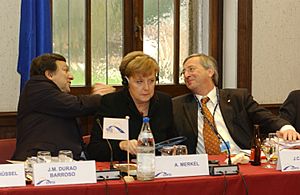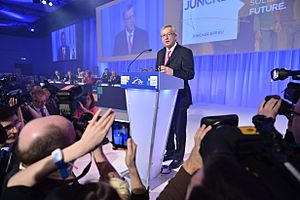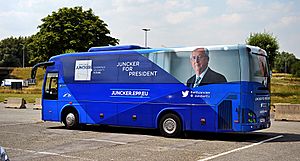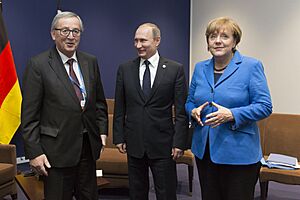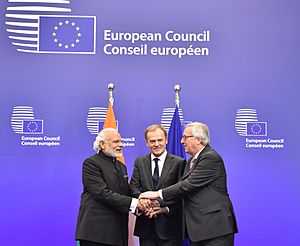Jean-Claude Juncker facts for kids
Quick facts for kids
Jean-Claude Juncker
|
|
|---|---|
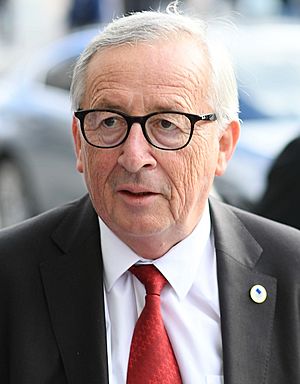
Juncker in 2019
|
|
| President of the European Commission | |
| In office 1 November 2014 – 30 November 2019 |
|
| First Vice President | Frans Timmermans |
| Preceded by | José Manuel Barroso |
| Succeeded by | Ursula von der Leyen |
| Prime Minister of Luxembourg | |
| In office 20 January 1995 – 4 December 2013 |
|
| Monarch | Jean Henri |
| Deputy | Jacques Poos Lydie Polfer Jean Asselborn |
| Preceded by | Jacques Santer |
| Succeeded by | Xavier Bettel |
| President of the Eurogroup | |
| In office 1 January 2005 – 21 January 2013 |
|
| Preceded by | Position established |
| Succeeded by | Jeroen Dijsselbloem |
| Minister for the Treasury | |
| In office 23 July 2009 – 4 December 2013 |
|
| Prime Minister | Himself |
| Preceded by | Luc Frieden |
| Succeeded by | Vacant |
| Minister for Finances | |
| In office 14 July 1989 – 23 July 2009 |
|
| Prime Minister | Jacques Santer Himself |
| Preceded by | Jacques Santer |
| Succeeded by | Luc Frieden |
| Minister for Work and Employment | |
| In office 20 July 1984 – 7 August 1999 |
|
| Prime Minister | Jacques Santer |
| Preceded by | Jacques Santer |
| Succeeded by | François Biltgen |
| Member of the Chamber of Deputies | |
| In office 20 July 1984 – 20 July 1984 |
|
| Personal details | |
| Born | 9 December 1954 Redange, Luxembourg |
| Political party | Christian Social People's Party (since 1974) |
| Other political affiliations |
European People's Party |
| Spouse | Christiane Frising |
| Education | University of Strasbourg |
| Signature |  |
Jean-Claude Juncker (born 9 December 1954) is a politician from Luxembourg. He served as the Prime Minister of Luxembourg from 1995 to 2013. After that, he became the President of the European Commission from 2014 to 2019.
He also held important roles like Finance Minister from 1989 to 2009. From 2005 to 2013, he was the President of the Eurogroup, a group of finance ministers from countries using the euro currency.
When Juncker finished his time as Prime Minister in 2013, he was the longest-serving leader of any national government in the European Union (EU). He was also one of the longest-serving democratically elected leaders in the world. His time as Prime Minister included the period of the European financial crisis.
In 2014, the European People's Party (EPP) chose Juncker as their main candidate, or Spitzenkandidat, for the presidency of the European Commission. This was the first time this process was used. The EPP won the most seats in the European Parliament. On 27 June 2014, the European Council officially nominated him. The European Parliament then elected him on 15 July 2014. He started his role on 1 November 2014 and served until 30 November 2019. Ursula von der Leyen took over from him.
Juncker focused on creating a digital single market and developing an EU Energy Union. He also worked on trade agreements and reforming the Economic and Monetary Union of the European Union.
Contents
Early Life and Education
Juncker was born in Redange, Luxembourg, and grew up in Belvaux. His father, Joseph, worked in a steel factory and was a Christian trade unionist. During World War II, his father was forced to join the German army after the Nazis occupied Luxembourg. Juncker often said that his father's stories about the war greatly influenced his belief in the need for European countries to work together for peace.
His mother was Marguerite Hecker. Juncker went to a Catholic secondary school in Belgium before returning to Luxembourg for his final high school exams. He joined the Christian Social People's Party in 1974. He studied law at the University of Strasbourg and earned a master's degree in 1979. Although he was allowed to practice law in Luxembourg in 1980, he never did.
Belvaux, where Juncker grew up, was a place with many different cultures, including Italian and Portuguese immigrants, because of its coal and steel industries. This environment helped shape Juncker's ideas about working together and integration. Coming from a family that didn't have much money, he made fighting against unfairness and promoting equal chances for everyone central to his political beliefs.
Career in Luxembourg Politics
Starting in Government
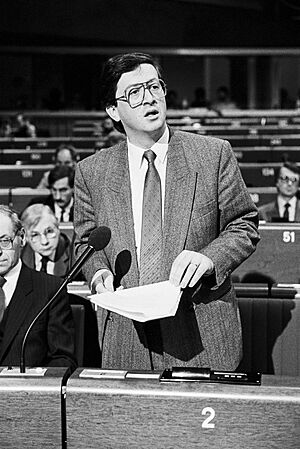
After finishing university, Juncker became a Parliamentary Secretary. In 1984, he was elected to the Chamber of Deputies for the first time. He was immediately appointed as the Minister of Labour in Prime Minister Jacques Santer's government.
In 1985, Luxembourg held the rotating presidency of the Council of the European Communities. This allowed Juncker to lead important meetings on social affairs and budgets, showing his skills in European leadership. This is where his strong support for Europe first became clear.
Before the 1989 election, Juncker was in a serious car accident. He recovered in time to be re-elected to the Chamber of Deputies. He was then promoted to Minister for Finance. This role was often seen as a step towards becoming Prime Minister. At this time, he also became Luxembourg's representative on the Board of Governors of the World Bank.
Shaping Europe's Future
Juncker's second election in 1989 brought him more attention in the European Union. He led the Council of Economic and Financial Affairs (ECOFIN) during Luxembourg's presidency in 1991. He played a key role in creating the Maastricht Treaty, which was a big step towards the euro currency. He was especially important in developing the "opt-out" principle, which helped the UK agree to the treaty. Juncker signed the treaty in 1992.
He was re-elected in 1994 and kept his role as Finance Minister. Six months later, when Jacques Santer was nominated to be the next President of the European Commission, Grand Duke Jean approved Juncker as Prime Minister on 20 January 1995. He formed a government with the Luxembourg Socialist Workers' Party. Juncker continued to serve as Minister for Finance.
Leading Luxembourg as Prime Minister
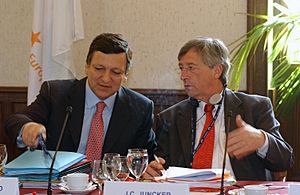
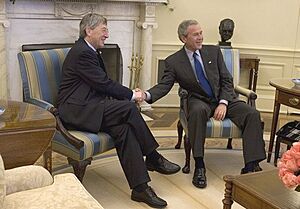
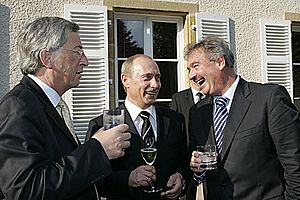
As Prime Minister, Juncker focused on building strong international relationships for Luxembourg. In December 1996, during a visit to Dublin, he helped solve a disagreement between French President Jacques Chirac and German Chancellor Helmut Kohl about the EU's economic policy. The media called him the "Hero of Dublin" for bringing them to an agreement.
In 1997, Luxembourg held the rotating Presidency of the European Council again. During this time, Juncker promoted the idea of social integration in Europe. He also started the "Luxembourg Process," which was a plan for European policy to fight unemployment. He also created the "Euro 11," an informal group of European finance ministers who discussed matters related to the euro. For his efforts, he received the Vision for Europe Award in 1998.
Juncker won re-election as Prime Minister in 1999. His government then formed a new partnership with the Democratic Party. After the 2004 election, the Luxembourg Socialist Workers' Party became the second largest party again, and Juncker formed a government with them once more.
In 2005, Juncker again became President of the European Council. Soon after, Luxembourg held a vote on the European Constitution. Juncker said he would resign if the vote failed. The people voted "Yes" by 56.5%. His dedication to European ideals earned him the 2006 Karlspreis.
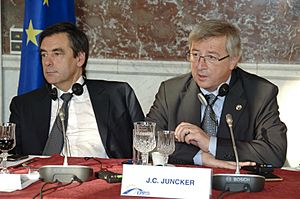
In 2012, there were reports about issues within Luxembourg's State Intelligence Service (SREL). A parliamentary inquiry was set up to investigate these claims. The report concluded that Juncker, as Prime Minister, had political responsibility for the service's actions and had not controlled it well enough. Juncker denied any wrongdoing.
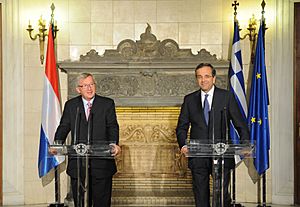
After a long debate in the Chamber of Deputies on 10 July 2013, Juncker's government partner, the Luxembourg Socialist Workers' Party (LSAP), withdrew its support. This led Juncker to agree to new elections. He resigned as Prime Minister on 11 July. After the election, Juncker's party, the Christian Social People's Party, went into opposition for the first time in 34 years. Xavier Bettel became the new Prime Minister on 4 December 2013.
Career in European Politics
Leading the Eurogroup
In 2004, the Eurogroup, which is made up of finance ministers from countries that use the euro, decided to have a permanent president instead of a rotating one. Juncker was chosen as the first permanent president and started his role on 1 January 2005. He was re-appointed in September 2006. This system was made official by the Lisbon Treaty, and Juncker was confirmed for another term. He stepped down on 21 January 2013, and Jeroen Dijsselbloem, the Dutch Finance Minister, took over.
During his time as "Mr. Euro," the Eurogroup played a key role in helping countries like Greece, Ireland, Portugal, Spain, and Cyprus that faced financial difficulties. Juncker also strongly supported closer cooperation within the group and better international representation.
President of the European Commission (2014–2019)
For the first time in 2014, the President of the European Commission was chosen using new rules from the Lisbon Treaty. Juncker's close aide, Martin Selmayr, was very important in his campaign and later as his chief of staff.
Election Process
Most major European political parties put forward a lead candidate, or spitzenkandidat, for the election. At the European People's Party (EPP) meeting in Dublin in March 2014, Jean-Claude Juncker was chosen as the party's lead candidate for Commission President.
In a big debate between the candidates, broadcast live across Europe, all candidates agreed that the European Council should only propose someone who had campaigned publicly for the position.
In the elections held from 22–25 May, the EPP won the most seats in the European Parliament (221 out of 751), but not enough for a majority on its own.
Official Approval
On 27 May, leaders of five of the seven political groups in the Parliament stated that Juncker, as the lead candidate of the party with the most seats, should be the first to try to form the necessary majority to become Commission President.
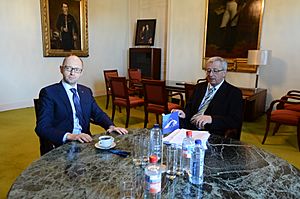
The European Council then asked its president, Herman van Rompuy, to talk with the Parliament's group leaders to find the best candidate. Juncker and the EPP agreed to work with the Progressive Alliance of Socialists and Democrats (S&D), the second largest group. They also gained support from almost all member state leaders. In return, the center-left group and leaders secured promises for a focus on economic growth and job creation.
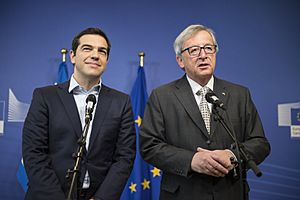
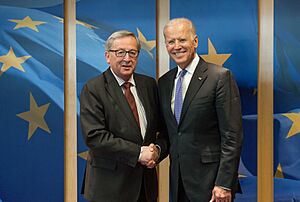
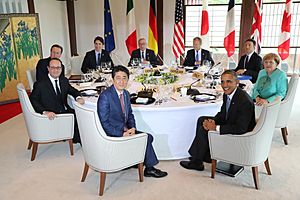
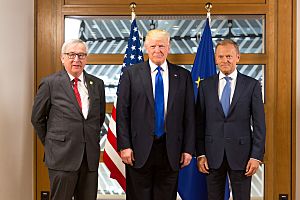
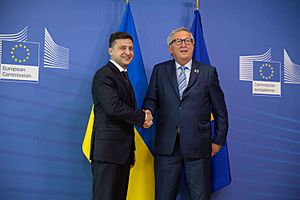
On 27 June, the European Council officially proposed Juncker to Parliament as a candidate. This nomination was not by full agreement; the Council voted 26–2 in favor. British Prime Minister David Cameron and Hungarian Prime Minister Viktor Orbán voted against.
On 15 July, Juncker presented his plans to the European Parliament. After a discussion, the Members of the European Parliament (MEPs) appointed Juncker as Commission President with 422 votes in favor, which was more than the 376 votes needed.
Views on Turkey and the EU
On 25 July 2016, Juncker stated that Turkey was not ready to become a member of the European Union in the near future. He also said that talks between the EU and Turkey would stop immediately if Turkey brought back the death penalty.
Personal Life
Jean-Claude Juncker speaks several languages fluently, including his native Luxembourgish, English, French, German, and Latin.
He is married to Christiane Frising. They do not have children.
Awards and Recognitions
Juncker has received many awards and honors throughout his career, both from his home country and from other nations and organizations. These include:
- Knight of the Order of Arts and Letters (France, 1985)
- Grand Cross of the Order of Merit (Luxembourg, 1988)
- Grand Cross of the Order of Prince Henry the Navigator (Portugal, 1988)
- Grand Officer of the Legion of Honor (France, 2002)
- Grand Cross of the Order of the Star (Romania, 2003)
- Commander of the Order of Polonia Restituta (Poland, 2004)
- Grand Cross of the Order of Christ (Portugal, 2005)
- Grand Cross of the Order of the Three Stars (Latvia, 2006)
- Grand Cross of the Order of Adolphe of Nassau (Luxembourg, 2007)
- Grand Cross of the Order of Isabella the Catholic (Spain, 2007)
- Grand Cross of the Order of Merit of the Italian Republic (Italy, 2007)
- Collar pro Merito Melitensi (Sovereign Military Order of Malta, 2010)
- Grand Decoration of Honour in Gold with Sash (Austria, 2010)
- Grand Cross of the Order of the Redeemer (Greece, 2013)
- Grand Cross of the Federal Order of Merit (Germany, 2013)
- Grand Cross of the Order of Vytautas the Great (Lithuania, 2013)
- Order of Friendship (Kazakhstan, 2014)
- Grand Cross of the Royal Norwegian Order of Merit (2014)
- The First Class of the Order of Prince Yaroslav the Wise (Ukraine, 2019)
- Companion with Star of the National Order of Merit (Malta, 2019)
- Grand Cordon of the Order of the Rising Sun (Japan, 2020)
He has also received many academic and other honors, such as:
- Honorary Doctorates from several universities, including Miami University (1998), University of Münster (2001), University of Bucharest (2003), Democritus University of Thrace (2004), Robert Schuman University of Strasbourg (2007), University of Pittsburgh (2008), University of Innsbruck (2010), University of Athens (2011), University of Sheffield (2012), University of Porto (2013), Aristotle University of Thessaloniki (2017), University of Salamanca (2017), and University of Coimbra (2017).
- The "Vision for Europe Award" (1998)
- The International Charlemagne Prize of Aachen (2006)
- The Gold Medal of the Jean Monnet Foundation for Europe (2008)
See also
 In Spanish: Jean-Claude Juncker para niños
In Spanish: Jean-Claude Juncker para niños
- List of prime ministers of Luxembourg
- Juncker–Poos Government (1995–1999)
- Juncker–Polfer Government (1999–2004)
- Juncker–Asselborn I Government (2004–2009)
- Juncker–Asselborn II Government (2009–2013)
- Luxembourg Leaks
 | Bayard Rustin |
 | Jeannette Carter |
 | Jeremiah A. Brown |


